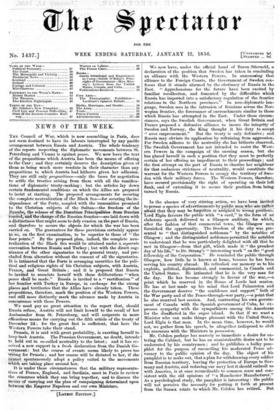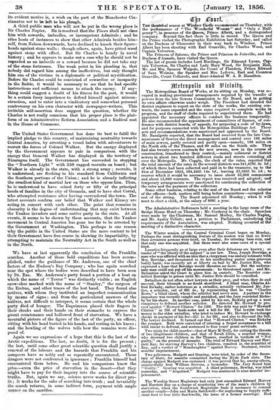In the absence of very stirring action, we have been
iivitei to peruse a species of advertisements by public men who are rather afraid that they may be lorgetteii or asisigSied to wrong positioffit Lord Elgin favours the public with ". a card," in the form of an elaborate speech delivered to a Glasgow auditory, for which, after the fashion of that commercial town, the Glasgow men furnished the opportunity. The freedom of the city was pre- sented to "that distinguished. nobleman" by the notables of Glasgow; and the distinguished nobleman permitted the notables to understand that he was particularly delighted with all that he met in Glasgow—from that gift, which made it " the proudest day of his life," to Dr. Strang's " interesting work " .on the "good fellowship of the Corporation." He reminded the public 'through Glasgow, how little he is known at home, because he has been serving his country abroad. He refreshed. our memory as to his exploits, political, diplomatical, and. commercial, in Canada and the United States. He i,ntimaMd that he is . the Wry man for the day. He has become strongly in favour of the war,—a point which he reserved in the House of Lords last session. He has at last made up his mind that Lord Palmerston and the Government deserve "the confidence and support hoth of the War party and. of the Peace-through-war party,—a point that he also reserved last session. And, -contrasting his own govern- ment of Canada with the Spanish government of Cuba, he ex- presses sympathy with the sympathizers among the Americans for the disaffected in the sugar island. So that if we want a Minister who can make things pleasant with the United States, Lord Elgin is that man. In the mean time, however' he would, not, we gather from his speech, be altogether indisposed to club his resources with the Ministers in possession. Mr. Cobden perhaps has scarcely so immediate a desire for en- tering the Cabinet, but he has an unmistakeable desire net to be underrated by his countrymen ; and he publishes a bulky pam- phlet for the purpose of reconciling his moderated Peace ad- vocacy to the public opinion of the day. The object of his pamphlet is to make out, that a plan for withdrawing every soldier from Russian territory, leaving the protection Of Europe to Ger- many and Austria, and reducing our navy lest it should embroil us with America, is at once reconeileable to common sense and con- sistent with the old opinions of "a Manchester Manufacturer." As a psychological study, the pamphlet is interesting : the public will not perceive the necessity for putting it forth at present from the Sussex estate to which Mr. Cobden has retired. But its evident motive is a wish on the part of the Manchester Cin- einnatus not to be left to his plough. A third public man who will not be put in the wrong place is Sir Charles Napier. He is resolved that the Times shall not class him with cowards, imbeciles, or incompetent Admirals ; and he cites hosts of instances to show that other Admirals besides him-. self, from Nelson downwards, have declined to knock their figure- heads against stone walls ; though others' again, have pitted wood against stone with effect. But Sir Charles is handy in naval history ; and he appears to make out a ease why he should not be regarded as an imbecile or a coward because he did not take any of the stone fortresses_ The weak point in his pleading is, that nobody did regard him among the ineffectives, but only thought him one of the victims in a diplomatic or political mystification. Before Sir Charles could be convicted of cowardice or incapacity in the Baltic, it would be necessary to see that he had specific instructions and sufficient means to attack the enemy. If any- thing could suggest a doubt of his fitness for the post, it would be a oertain fussy impatience to defend himself against miscon- struction, and to enter into a vindicatory and somewhat personal controversy on his own character with newspaper-writers. This irritable self-assertion does suggest the question, whether Sir Charles is not really conscious that his proper place is the plat- form of an Administrative Reform Association and a Radical seat in the House of Commons.



























